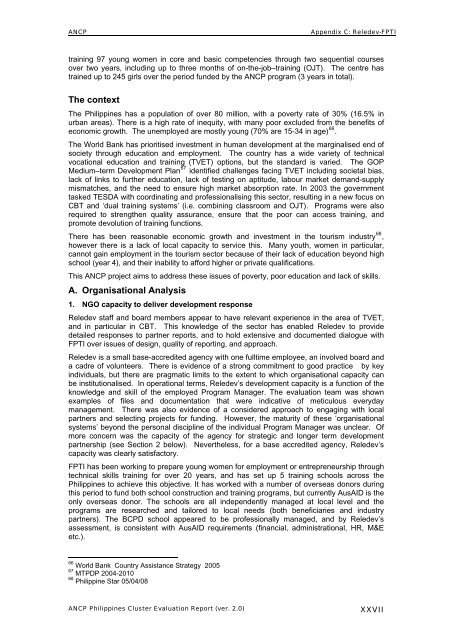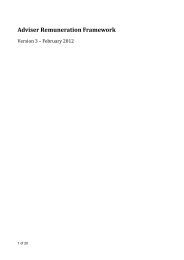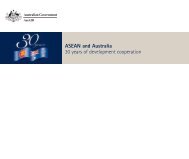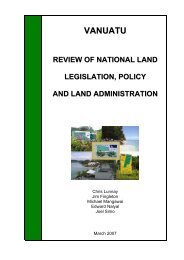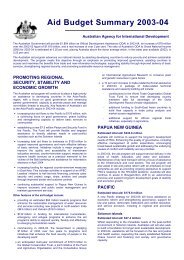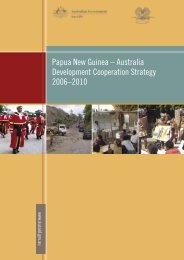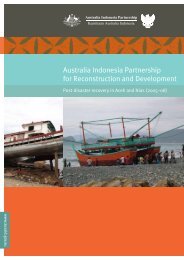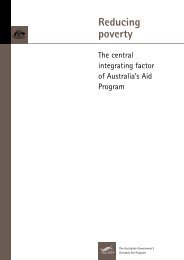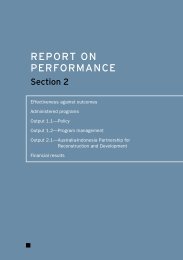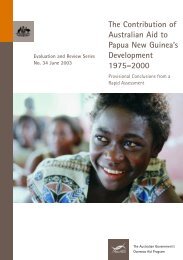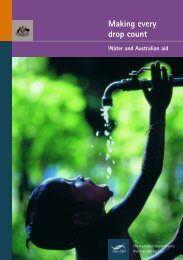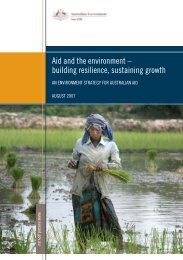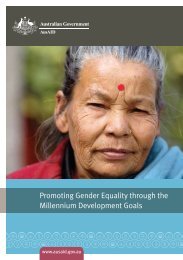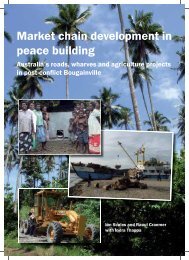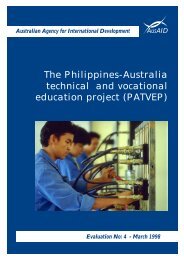ANCP Philippines Cluster Evaluation Report - AusAID
ANCP Philippines Cluster Evaluation Report - AusAID
ANCP Philippines Cluster Evaluation Report - AusAID
Create successful ePaper yourself
Turn your PDF publications into a flip-book with our unique Google optimized e-Paper software.
<strong>ANCP</strong>Appendix C: Reledev-FPTItraining 97 young women in core and basic competencies through two sequential coursesover two years, including up to three months of on-the-job–training (OJT). The centre hastrained up to 245 girls over the period funded by the <strong>ANCP</strong> program (3 years in total).The contextThe <strong>Philippines</strong> has a population of over 80 million, with a poverty rate of 30% (16.5% inurban areas). There is a high rate of inequity, with many poor excluded from the benefits ofeconomic growth. The unemployed are mostly young (70% are 15-34 in age) 66 .The World Bank has prioritised investment in human development at the marginalised end ofsociety through education and employment. The country has a wide variety of technicalvocational education and training (TVET) options, but the standard is varied. The GOPMedium–term Development Plan 67 identified challenges facing TVET including societal bias,lack of links to further education, lack of testing on aptitude, labour market demand-supplymismatches, and the need to ensure high market absorption rate. In 2003 the governmenttasked TESDA with coordinating and professionalising this sector, resulting in a new focus onCBT and ‘dual training systems’ (i.e. combining classroom and OJT). Programs were alsorequired to strengthen quality assurance, ensure that the poor can access training, andpromote devolution of training functions.There has been reasonable economic growth and investment in the tourism industry 68 ,however there is a lack of local capacity to service this. Many youth, women in particular,cannot gain employment in the tourism sector because of their lack of education beyond highschool (year 4), and their inability to afford higher or private qualifications.This <strong>ANCP</strong> project aims to address these issues of poverty, poor education and lack of skills.A. Organisational Analysis1. NGO capacity to deliver development responseReledev staff and board members appear to have relevant experience in the area of TVET,and in particular in CBT. This knowledge of the sector has enabled Reledev to providedetailed responses to partner reports, and to hold extensive and documented dialogue withFPTI over issues of design, quality of reporting, and approach.Reledev is a small base-accredited agency with one fulltime employee, an involved board anda cadre of volunteers. There is evidence of a strong commitment to good practice by keyindividuals, but there are pragmatic limits to the extent to which organisational capacity canbe institutionalised. In operational terms, Reledev’s development capacity is a function of theknowledge and skill of the employed Program Manager. The evaluation team was shownexamples of files and documentation that were indicative of meticulous everydaymanagement. There was also evidence of a considered approach to engaging with localpartners and selecting projects for funding. However, the maturity of these ‘organisationalsystems’ beyond the personal discipline of the individual Program Manager was unclear. Ofmore concern was the capacity of the agency for strategic and longer term developmentpartnership (see Section 2 below). Nevertheless, for a base accredited agency, Reledev’scapacity was clearly satisfactory.FPTI has been working to prepare young women for employment or entrepreneurship throughtechnical skills training for over 20 years, and has set up 5 training schools across the<strong>Philippines</strong> to achieve this objective. It has worked with a number of overseas donors duringthis period to fund both school construction and training programs, but currently <strong>AusAID</strong> is theonly overseas donor. The schools are all independently managed at local level and theprograms are researched and tailored to local needs (both beneficiaries and industrypartners). The BCPD school appeared to be professionally managed, and by Reledev’sassessment, is consistent with <strong>AusAID</strong> requirements (financial, administrational, HR, M&Eetc.).66 World Bank Country Assistance Strategy 200567 MTPDP 2004-201068 Philippine Star 05/04/08<strong>ANCP</strong> <strong>Philippines</strong> <strong>Cluster</strong> <strong>Evaluation</strong> <strong>Report</strong> (ver. 2.0)XXVII


